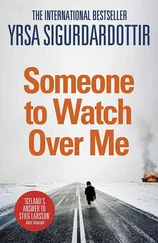Thóra stopped outside the door and looked around her. The women at reception, deep in conversation, didn’t notice her. She swiped the plastic key card, opened the door, and darted inside. Jónas tried to act like an innocent hotelier, but was finding the role increasingly difficult. He had an instinctive dislike of the police, which had always appeared to be mutual on the rare occasions when their paths crossed. Police officers also had a tendency to look deep into his eyes while they talked to him, and Jónas had the feeling they had been trained to evaluate the truthfulness of replies from the movement of the pupils. He knew he was blinking far too much, which wasn’t making a good impression.
He cleared his throat. “As I told you, the description could fit the architect Birna, but it’s much too general to say for certain. Wasn’t the woman carrying any ID, a bag or something?” He stretched toward the window behind him. “Don’t you find it hot in here? Should I open the window?” Jónas was afraid that sweat would start pouring from his brow to complete the picture of a guilty man.
The police officers exchanged a look. They seemed to be keeping their cool in spite of being clad in full regalia, black uniforms with gold braid. Ignoring the stifling heat in the room, they had not taken off their jackets. They were holding their caps, however. Disregarding Jónas’s inquiries about the window and the ID, they went on questioning him. “When was she last seen, this Birna?”
“I don’t know exactly,” Jónas replied, searching through his memory. “She was here yesterday, definitely.”
“So you saw her yesterday?” asked the younger officer. He looked like a tough guy, and Jónas preferred the older one, who appeared to be a softer type in all respects.
“What?” Jónas asked rather idiotically, then hurried to add, “What, yes. I met up with her. Several times in fact. She was struggling to complete the plans for the annex that’s to be built here and came to me throughout the day to consult me on various points.”
The officers nodded in unison. After biting the inside of his cheek for a few moments, the older one asked, “What about today? Did she come and see you today?”
Jónas shook his head fervently. “No. Definitely not. We were supposed to meet this morning only she didn’t turn up. I’ve been keeping an eye out for her but haven’t bumped into her or seen her. I kept calling her mobile, but it was switched off. I just got her voice mail.”
“What kind of mobile did she have? Can you describe it?” the younger man asked.
Jónas did not need to think about that question. Birna’s mobile was very distinctive. He had seen her with it many times. “It’s bright red, a clamshell phone. Shiny. Quite small. I don’t know the make, though. There was a big silver peace sign on the front, but I don’t think it was a brand logo, just a decoration.” The police officers darted glances at each other, then stood up together. Jónas stayed seated. He was feeling more confident after finally being able to answer one of their questions. “This woman who was found … did she die in an accident?”
Neither of the officers answered him. “Would you please show us to Birna Halldórsdóttir’s room?” Thóra took a last look around the room. She had not found anything significant. Admittedly it was different from other hotel rooms, because the architect had clearly moved in for longer than most people. She had fixed sketches of buildings—which Thóra presumed to be proposals for the annex that Jónas had said he was planning to build—to the walls. Notes had been scrawled on several of the drawings, some of them comprehensible to a layman, others not. Calculations had been made in some of the margins, and the sums were underlined in red ink. The figures were large ones, and Thóra hoped for Jónas’s sake that they were not cost estimates.
Thóra had opened the closet mostly out of curiosity, as she’d never expected to find anything important there. She had stuck a pencil through the handle to open the door, so as not to leave fingerprints. She needn’t have bothered, because all the contents told her was that Birna was an exceptionally tidy person. There weren’t many items of clothing: blouses, smarter trousers, and jackets were on clothes hangers, and the other garments were neatly arranged on the shelves. The woman must have worked in a boutique at some point, as they were all folded perfectly. Birna had good taste; her clothes were unpretentious but stylish and looked expensive. Thóra tried to peek at the label on a sweater at the top of the stack, but couldn’t read it without disturbing the pile. Closing the closet, she went over to the telephone on one of the bedside tables. She used her fingernail to press the recall button and see the last numbers she had dialed, then took a blank sheet of paper from the hotel notepad beside the telephone and wrote down the three numbers. She folded the sheet of paper and put it in her pocket.
Looking around, she saw nothing that merited closer examination except the desk drawer. She had already gingerly shuffled the papers on the desk, but was none the wiser for it. They all seemed to be connected with the design of the annex, mainly brochures from manufacturers of construction materials. Thóra nudged the desk chair to one side with her foot to reach the drawer. Now she faced a problem, because there was no handle on it. Pulling her sleeve over her right hand, she opened the drawer by tugging it from underneath. It contained two books: the New Testament and a leather-bound diary with Birna’s name on it. At last she had found something useful. Still using her sleeve, Thóra fished the book up out of the drawer. She flipped it open. Bingo. The pages were filled with neat handwriting. Thóra grinned, but then her smile vanished. She could hear noises in the corridor, just outside the door.
In desperation she looked around. She had to get out. She couldn’t possibly explain what she was doing there—she didn’t even know herself. She ran over to the floor-length curtains and prayed that all the rooms were the same. Fortunately for her, they were, and with trembling hands she unlocked the French window and stepped out on to the deck. Then she pushed the door closed as carefully as she could and hurried away.
As Thóra rounded the corner of the building, she took a deep breath. Her heart was pounding. What had she been thinking? She must be insane. It had been a close call; she was certain she had heard the room door open just as she had closed the balcony door behind her. She inhaled deeply again. Her heartbeat slowed down, then leaped once more. The desk drawer! She had left it open. She tried to calm herself. So what? Everyone would assume Birna had left it like that. She sagged in relief, then jumped again—in her hands she was still holding a diary marked “Birna Halldórsdóttir, Association of Icelandic Architects.”
As the police car pulled slowly out of the drive, Jónas felt that the officers had done all they could to prolong their visit. They must have known that the sooner they left, the fewer visitors would have noticed them. He heaved a sigh of relief when the car finally disappeared from sight, praying they would not need to come back. He knew his prayers wouldn’t be answered. They had sealed off Birna’s room, after a quick look inside to check she wasn’t there, and ordered Jónas to make sure that no one went in until it had been searched. Clearly Jónas had not seen the last of them.
His only hope was that the dead woman would turn out not to be Birna, but that was wishful thinking. Before leaving the scene, the police officers had asked Jónas to point out her car in the car park. It was a dark blue Audi Sport, which she had recently bought, and was parked at the very end of the car park. Birna always parked as far away from other cars as possible, to reduce the likelihood of careless drivers opening their doors and scratching her pride and joy. The policemen had walked up to the car, and one of them had produced a little plastic bag from his pocket. Without opening the bag, he had pointed it at the car and squeezed its contents. The sports car had beeped and flashed. The police officers exchanged meaningful looks.
Читать дальше












